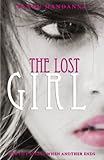
Price: £11.99
Publisher: uct type: ABIS BOOKBrand: Definitions (Young Adult)Mandanna, Sangu (Author)English (Publication Language)
Genre: Fiction
Age Range: 14+ Secondary/Adult
Length: 400pp
Buy the Book
The Lost Girl
So often, debut novels start promisingly with an original idea which draws you in, but then disappoint at the end for failing to deliver on that early promise. The Lost Girl is not such a debut. It begins rather unpromisingly, with so implausible an idea; you can’t see how the author is going to pull it off convincingly. But pull it off she does, in this clever, assured and well thought out story.
Taking Mary Shelley’s Frankenstein as her inspiration (reading it apparently sent her into a ‘writing frenzy’), Sangu Mandanna imagines a world where ‘echoes’ are made by the ‘Weavers’ as copies of living beings, and raised in their image, ready to replace them should they die. In a quiet corner of the English Lake District, 16-year-old echo Eva (who has named herself contrary to the strict laws which govern echo behaviour) has been schooled all her life to replace her ‘other’: a girl called Amarra who lives in India. In preparation, Eva must study every aspect of Amarra’s life, from what she likes to read and eat, to what it feels like to kiss her boyfriend Ray. Rebellious Eva, who wants ‘to be human so badly it hurts’, constantly strains at her masters’ leash, though the penalties for disobedience are severe, and even capital. Then Amarra dies in an accident, and within days, Eva finds herself on the plane to Bangalore. She must forget the loving familiars who brought her up. She must forget Sean, the boy with whom she has fallen in love. And she must convincingly lead a life that is not hers, or face destruction.
It’s obvious from the beginning. Amarra must die or there will be no story. It’s also obvious that Eva will struggle to replace her, as would anyone who tried to replicate a real person with all their nuances and subtleties of being, and their uniqueness of soul. And the whole concept of sending Eva half way round the world to another culture, on the premise that she could remain undetected as an imposter by a dead girl’s nearest and dearest strains credulity. But the strain is largely relieved by Eva’s compelling story, and Mandanna’s thought-provoking exploration of the things that make us human and the fact of life that is loss. The setting is intriguing too. Though The Lost Girl has the feel of a story set in our own time, its themes are futuristic ones. And at the same time, the sinister charge of grave-robbing against the Weavers brings to mind the murky Burke and Hare world of the early nineteenth century.
I did have reservations. Amarra’s apparently miraculous return to life after her fatal accident is too deftly explained away. It niggled at me that someone should have smelled a rat sooner. And when Eva tells us that ‘when they made me they had to put bits of her into me’, I found myself wanting to know more about how the Weavers came to make echoes, and their exact place in society. I wanted to hear more of Amarra’s side of the story too, because it must be pretty unsettling to live with the knowledge that an echo waits your death in the wings.
‘The dead don’t need us. They echo all by themselves.’ In that sense, the ending is a foregone conclusion. But it also leaves plenty of unanswered questions and that is fine, because a novel of this nature should.



